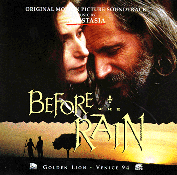Young and talented, Labina Mitevska is a Macedonian actor whose star is on the rise, the low international profile of Balkan actors notwithstanding. Despite the international acclaim heaped in the past decade on Southeastern European films such as Pred doždot (Before the Rain, 1994), Podzemlje (Underground, 1995), and To Vlemma tou Odyssea (Ulysses Gaze), few actors from the war-torn region have risen to equal prominence, with Rade Šerbedžija and Miki Manojlović being perhaps the most noted.
Now, with fresh international accolades and a burgeoning family-run production company, Labina Mitevska is sure to join their ranks.
Born in 1975 to an artistic family in Skopje, Macedonia, Mitevska studied in the faculty of Art and Archaeology at the University of Sts Cyril and Methodius, as well as at the European Film College in Denmark and the University of Arizona's Department of Art History. In addition to being chosen by European Film Promotion as one of Europe's sixteen "Shooting Stars" of 1998 at the 48th annual Berlin International Film Festival, marking her as an up-and-coming actor to watch, Mitevska's talents have been rewarded by both Macedonian and international scholarships and honours.
 |
| Oscar nominee |
In 1996, Mitevska played the supporting role of Sonja in Welcome to Sarajevo, her first professional collaboration with British director Michael Winterbottom, who next cast her as Smokey, one of the lead roles in I Want You (1998).
As well attracting attention for her acting ability, Mitevska also raised waves with an explicit love scene in the film. At its Balkan premiere, she explained, "when I firstly saw and read the screenplay, I liked the part, and I was more relaxed when I heard that I Want You had a small team and a low budget and that the work would be done in very relaxed conditions. So, when the delicate scenes were shot, they were closed, which offered relaxing conditions for creative freedom."
Mitevska's most recent work is also internationally based. She has a lead role in the Czech film Samotáři (Loners, 2000) and also appears in Too Bad That Balkan Express Was Already Used (currently in production), directed by her sister Teona Mitevska and produced by the production company they founded with their brother.
Her work has not passed unnoticed and, in 1998, Mitevska was admitted to the European Film Academy - joining other Southeastern European members, including Emir Kusturica, Dušan Makavejev, Ivan Ničev, Theo Angelopoulos and Stole Popov. She has also served as a jury member at several international film festivals.
Despite her on-screen success, Mitevska continues to enjoy a varied career. In addition to appearing in stage productions, Mitevska was a participant in the November 1999 Kultur Kontakt conference "South-Eastern European Women in Transition" in Vienna, and her essays have appeared in a number of leading Macedonian magazines, including Start and Dnevnik. She has also enjoyed success in Macedonian television productions, and was co-author of the promotional package for 1996's Skopje Summer Festival.
 |
| The Czech connection |
LM: At the moment Petr Zelenka and David Ondříček are among the most talented and original young film-makers in the Czech Republic. I met Petr at the film festival in Cottbus, where I was a member of the jury [in 1998] and his film was among the competitors. Everyone on the jury liked his film and we all agreed that good stuff is to be expected from him in the future.
In any case, after the festival Petr came to me and told me that he is writing a new script and asked me if I would be interested in working with him. A couple of months later he sent me the script. I liked it, and that is how our co-operation began.
He is an interesting script-writer who always surprises the audience with his new films. The same holds true for Samotáři, a story about young characters lost in their solitude and unable to cope with the transition period. They can't accept and understand the process of change and they do not see a "bright future." Everyone is looking for an exit from the problems that bother them. When I read the script it reminded me of what is happening to the youth in Macedonia and in the rest of Eastern Europe, and this was my main inspiration in accepting the role in this film.
CER: Your company, Sisters and Brother Mitevski Productions, helped develop Too Bad That Balkan Express Was Already Used. Why did you get into film production in the first place?
LM: Although the idea is old, we agreed that now is the right moment to start with a foundation and a production company. My family has always followed creative initiatives and we decided that this initiative was the best way to continue with such a path. In the film industry it is difficult to realize your ideas as you see fit. In this film, and I hope in the future too, we have been in control of the creative element of its development - the area in which we are most interested.
CER: Do you have any desire to direct or produce your own films in the future?
LM: Right now we have divided our "roles." My sister Teona is a director, I am an actress and co-producer, and my brother Vuk helps with the scenography. I am just beginning my involvement in the production business, but I plan to deepen this activity in my sister's next films, and in my brother's art exhibitions.
CER: Recently you have founded a charitable foundation. Can you tell us something more about it?
LM: As I already mentioned, within the production house we have also founded the Sisters and Brother Mitevski Foundation. As young persons involved in arts, we were revolted and frustrated. We started the foundation with the intention to urge changes in society, to show that very little is needed for youth to be motivated to produce masterpieces.
For these reasons we decided to start caring for young Macedonian talent. This year we donated black-white film roll and a sound roll to two young talented directors, so as they can make two shortfilms. We also helped a young sculptor so as he can make a couple of sculptures, one of which will be donated to the city of Skopje.
CER: You are a member of the European Film Academy, which distributes the Felix-Awards. This award is far from being as popular as it would deserve. Why so?
 |
| Fighting tough |
CER: What kinds of new film roles are you looking for?
LM: I have never thought of the roles as fragments outside of the whole film. I can not say what kind of roles I would like to play in because each one of them brings something new and exciting.
CER: Are you looking for scripts from any particular country?
LM: No, I have never done that. So far I have played in films made in different countries, played in different languages. I must state that acting in a foreign language is more difficult than acting in your native one, but this is not my primary concern since acting is what I do and I enjoy it. I enjoy discovering new cultures, traditions, and music, and I bring these to the characters I play.
Acting is wonderful because you are the maker of your own work. How interestingly you do that are, how seducing it is for the audience, depends only on your work. As an artist you can not limit yourself, you can not put limits and borders, because you do not look for a specific country, language, or director, but for a specific script.
CER: Of those you've played, who is your favourite character?
LM: I like all my roles and I am emotionally attached to them. I have had easier and more difficult roles, and I have worked with "easier and more difficult" directors. But at the end what remains is your moment on-screen and this makes me happy and fulfilled. Many believe that acting is an easy occupation, but believe me that film work completely exhausts you.
Preparations, shootings, make-up, costumes, reflectors, premiers, photo opportunities, all this is connected with acting. But we work for our public and we forget the enormous sacrifices and efforts we make when we see the audiences' tears or smiles.
CER: Could you live outside Europe?
LM: Yes I could. Although it depends where outside of Europe. I could, definitely. I love Europe very much, but sometimes I get sick of the pride and egocentrism of Europeans, and ask myself whether all my ideals and dreams are for united European art?
CER: Is there something that you could hardly live without?
LM: My family and close friends are those I love and respect most. And the most beautiful, the one-and-only, the Macedonian sun.
Židas Daskalovski, 17 April 2000
Moving on:
- Return to CER front page
- Archive of Židas Daskalovski's articles in CER
- For more articles on Central and East European film see the Kinoeye Archive



